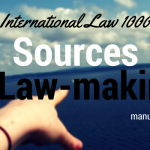I already said it at the beginning of the previous entry in this series (it’s been some time back, I know): International law still begins and ends with the state. It is the original subject of international law because without the sovereign state, there would be no need for international law in the first place. And the modern question is to what extent other entities – like individuals, international organizations – also have international legal personality and thereby a subject of international law. For now we can suffice with the conclusion that the state is the only subject with complete legal personality. But as always, first things first.
When is a state a state?
There are always new states that are in the process of being formed. Often they do so in violent fits and shocks. And the process occurs somewhat in a legal grey area. International law contains no prohibition for any person or group in a certain territory to declare independence from an existing state, but there no general right to an independent state either. Whether a new state has come into existence is largely a matter of fact. So any legal evaluation of whether a state has come into existence is based on the fulfillment of certain objective criteria: ’a permanent population; a defined territory; government; and capacity to enter into relations with the other states’.
- The population of a state may be as small as 10.000, like that of San Marino, without that number eroding its status as a sovereign state.
- A state’s territory does not need to be defined in an absolute manner, but only ’sufficiently’ so. Given the proliferation of Israeli settlements in Palestinian territory and the unresolved issue of Jerusalem one could question, therefore, whether the territory of such countries as Palestine fulfills that criterion.
- Effectiveness is the most crucial test for a state claiming sovereignty of a territory. But whether the self-proclaimed government of a territory and population is indeed effective can be equally in doubt. Palestine could again serve as an example. At the same time, however, when the government of an established sovereign state is no longer effective – let’s say Somalia, the state does not cease to exist. Only its international representation is in limbo.
Statehood and recognition
When all these criteria be fulfilled, there is no guarantee that the state has the ’capacity to enter into relations’. Can the new ’state’ actually function as a state with external relations and respect for its sovereignty. Whether this must be seen as a practical or legal requirement for the state’s existence is almost irrelevant. A state can only function as a state if it is recognized as such by other states. Legal doctrine says that it is indeed not a legal requirement based on the so-called declaratory theory, but statehood without recognition by other states is meaningless.
A word of caution: Recognition of the state is different from the recognition of its government. Traditionally, international law has not cared much about the form a government may take, as long as it is effective. Through international fora, states have been expressing a preference for democracy, but only when a state is in turmoil and transition. Calls for democracy ring rather hollow, however, when states do not agree on the substance of democracy except for free and fair elections.
External Self-determination
For many groups of people, statehood is the ultimate price, but international law does not make it easy for them. Any group can claim and attempt to gain independence, but only under stringent circumstances can such a group appeal to a legal right. The fundamental right to self-determination grants a ’people’ the right to ’freely determine their political status and freely pursue their economic, social and cultural development’. However, for all groups that qualify as a ’people’ international law stresses the exercise of the right within the borders of an existing state, i.e. international self-determination. Only two categories of ’peoples’ qualify for external self-determionation, i.e. independence. First, colonial peoples. Self-determination was included in the post-World War II international order as a basis for European colonies in Africa to undergo a decolonization process. However, this independence was conditioned on the preservation of the existing colonial borders. This has lead to all those straight lines on the map. The second group consists of those that are ’subject to alien subjugation, domination or exploitation outside a colonial context’, however this may be interpreted. These two categories have a clear right to external self-determination.
In the Secession of Quebec-case, however, the Canadian Supreme Court inadvertently acknowledged the possibility of a right to external self-determination for a third category. If a people is frustrated or even denied in its right to international self-determination, it may argue that it also has a right to independence. The Court did not necessarily support such a possibility, but some have taken the Court’s words as establishing a third category of peoples having a right to external self-determination.
The End
A state will cease to exist when it breaks up into several new states, like Yugoslavia or Czechoslovakia. States can also merge or unify such as North- and South Yemen. In a case like the former Soviet Union, a state is dismembered, but one of the new states – the Russian Federation – can become the legal successor of the former state. The Russian Federation has taken over most of the rights and obligations of the Soviet Union. However, the international community did not accept the Federal Republic of Yugoslavia (now Serbia) as the legal successor to the Socialist Federal Republic of Yugoslavia. How a new state is characterized has complex consequences for the international rights and obligations of the new state that it may or may not inherit. Such complexity is beyond this series however…
Another installment of this series next month! I would appreciate any feedback in the comments below, or through Facebook or Twitter!



